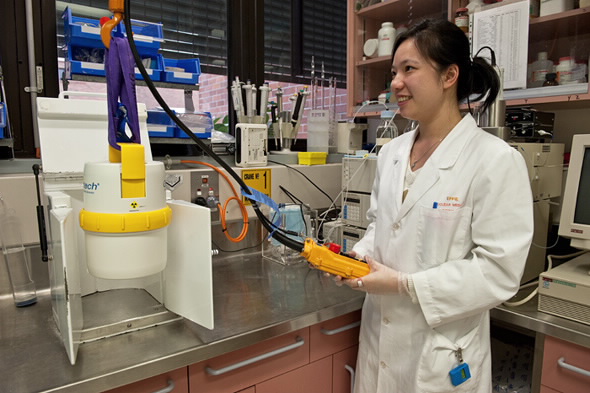The Australian Parliament has been updated today on plans to put our country front and centre in the fight against a looming international nuclear medicine supply crisis.
 |
| Australia will go from producing 550,000 doses of nuclear medicine to making enough medicine to help 20 million people a year around the world. |
Global supply of nuclear medicine is under threat, with reactors responsible for 70 per cent of the world’s Molybdenum-99 (Mo-99) production due to be decommissioned in the next few years.
Mo-99 is the base material used in scans that diagnose heart disease and a variety of cancers. Applications include for bone oncology, neurology, the kidney and gastrointestinal tract disorders.
The CEO of ANSTO, Dr Adi Paterson, today outlined Australian plans to combat the shortage to a Budget Estimates Hearing.
Under the plans, Australia will go from producing 550,000 doses of nuclear medicine at the Lucas Heights reactor to making enough medicine to help 20 million people a year around the world.
"With the termination of the life of these [international] reactors there would be an inability to confidently and predictably supply Mo-99 into the global market," Dr Paterson advised the Committee.
Earlier this year ANSTO and the Australian Government announced the $168 million plan to significantly increase ANSTO’s nuclear medicine production capacity.
What this means is that in addition to securing Australia’s own supply of potentially life-saving nuclear medicine, we will be able to help meet a significant proportion of the world’s needs.
Speaking today after the hearing, Dr Paterson said, “One in two Australians will receive a nuclear medicine procedure in their lifetime, and around 80 per cent of those will need Mo-99.
“Mo-99 is a key tool in the fight against cancer and heart disease. It’s absolutely essential for an effective diagnosis.
“In the face of increasing demand and diminishing supply, Australia is taking a global leadership role in meeting healthcare needs.
“And because we will achieve mass production of nuclear medicine with low enriched uranium – this will contribute significantly to Australia’s non-proliferation goals.
“The world is asking for safe, low-enriched uranium based medicine – as recognised by the fact the USA has put measures in place to favour Mo-99 produced in Low Enriched Uranium reactors, such as that made in Australia’s OPAL reactor.
“The development of a world supply of Mo-99 from Australia significantly strengthens our position as an important contributor to global nuclear security and non-proliferation.”
Key facts
The plan will be delivered by scientists and engineers working at ANSTO campus at Lucas Heights. It comprises:
- A nuclear medicine manufacturing plant, which will secure Australia’s ability to produce Molybdenum-99 (Mo-99). Mo-99 is primarily used for diagnosis of heart disease and cancers. Applications include for bone oncology, neurology, the kidney and gastrointestinal tract disorders. In Australia alone, each year 550,000 people receive a diagnosis using Mo-99
- A co-located Synroc waste treatment plant, which will deliver a permanent, safe and economical way of managing by-products from current and future manufacture of nuclear medicines. Synroc is an Australian innovation that can reduce the pre-storage volume of nuclear medicine by-products by up to 99 per cent when compared to other methods such as cementation. Synroc offers similar benefits for other forms of waste, achieving up to 95 per cent reductions in volume.
- The creation of 250 new jobs (150 construction and 100 operational jobs) – which is in addition to the approximately 1200 jobs already directly supported at ANSTO.
Published: 17/10/2012


